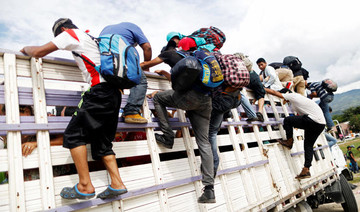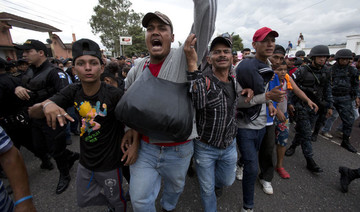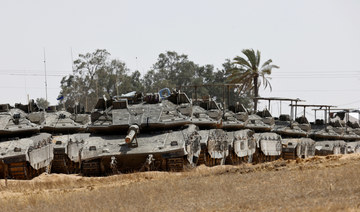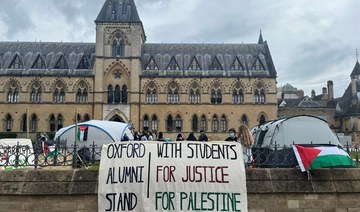CHIQUIMULA, Guatemala: More than 2,000 Honduran migrants traveling en masse through Guatemala resumed their journey toward the United States on Wednesday as US President Donald Trump sought to turn the caravan into a political issue three weeks before midterm elections.
A day after warning Central American governments they risk losing US aid if they don’t do something and saying that anyone entering the US illegally would be arrested and deported, Trump turned his sights on Democrats and urged Republican allies to campaign on border security.
“Hard to believe that with thousands of people from South of the Border, walking unimpeded toward our country in the form of large Caravans, that the Democrats won’t approve legislation that will allow laws for the protection of our country. Great Midterm issue for Republicans!” Trump said in a Wednesday morning tweet.
“Republicans must make the horrendous, weak and outdated immigration laws, and the Border, a part of the Midterms!” he continued.
In Guatemala, the migrants rose early and many left without eating breakfast, bound for Zacapa, the next city on their route. Overcast skies and a light drizzle took the edge off the sweltering heat and humidity, making the trek more bearable.
Luis Navarreto, a 32-year-old migrant in the caravan, said he had read about Trump’s threats to his country but was undeterred.
“We are going to continue,” Navarreto said. “It is God who decides here. We have no other option but to move ahead.”
The migrants are fleeing widespread poverty and gangland violence in one of the world’s most murderous countries, and many blame Honduran President Juan Orlando Hernandez for what they call unlivable conditions back home.
“We are here because of Juan Orlando,” said Nelson Zavala, a 36-year-old laborer.
The previous day the migrants advanced about 30 miles (40 kilometers) from the Honduras-Guatemala border to arrive at the city of Chiquimula.
That is a tiny portion of the almost 1,350 miles (2,200 kilometers) they would have to travel to reach the closest US border.
Some were able to hitch rides, packing the flatbeds of pickups and farm trucks, and even cargo holds of semis, while many more continued on foot with backpacks, strollers and Honduran flags. Hundreds advanced farther and faster than the main group to reach the Guatemalan capital, according to the Casa del Migrante shelter there.
The caravan has snowballed since about 160 migrants departed Friday from the Honduran city of San Pedro Sula, with many people joining spontaneously while carrying just a few belongings. Estimates of their numbers ranged up to 3,000.
Three weeks before the US elections, the caravan was bound to draw Trump’s ire. But he did not follow through on a similar threat to cut aid to Honduras in April over an earlier caravan, which eventually petered out in Mexico.
On Tuesday, Honduras’ president accused unnamed “political groups” organizing the caravan based on lies in order to cause problems in Honduras.
“There are sectors that want to destabilize the country, but we will be decisive and we will not allow it,” Hernandez told reporters.
Earlier the Foreign Ministry alleged that people had been lured to join the migration with “false promises” of a transit visa through Mexico and the opportunity to seek asylum in the United States.
In a joint statement Wednesday, Mexico’s Foreign Relations and Interior departments said anyone in the caravan with travel documents and a proper visa will be allowed to enter, and anyone who wants to apply for refugee status can do so.
But the statement said all cases must be processed individually, suggesting that authorities have no intention of letting the migrants simply cross the border en masse without going through standard immigration procedures.
It warned that anyone who enters Mexico in an “irregular manner” faces detention and deportation.
None of the migrants The Associated Press spoke to on the road was carrying a passport. When agents in Guatemala near the Honduran border asked a crowd of them what documentation they were carrying, they held up national personal ID cards, which allow them to move through most countries in Central America — but not Mexico, which requires foreigners to present a passport for entry.
Late Tuesday, Trump said via Twitter that Washington had told Honduras, Guatemala and El Salvador that the US will stop aid “if they allow their citizens, or others, to journey through their borders and up to the United States, with the intention of entering our country illegally.”
Guatemalan President Jimmy Morales said Wednesday that he had spoken twice with US President Mike Pence.
As for Guatemala’s government, Morales said, “We do not accept conditions; we do not impose conditions. What we do is accept our responsibilities and we are going to prioritize what our laws say.”
He added that he had also discussed with Honduras’ Hernandez the facilitation of “the most comfortable, feasible and humane return possible for any who wish to go back.”
Morales said that while Central Americans are legally free to transit from country to country, a “massive ingress of people without registering” puts Guatemala in a difficult position because it’s impossible to know who the people are and what may be the intentions of any of their leaders.
Luis Arreaga, the US ambassador to Guatemala, posted a video message on Twitter to migrants thinking of entering the United States illegally.
“If you try to enter the United States, you will be detained and deported,” Arreaga said in Spanish. Addressing those already en route, he added: “Return to your country. Your attempt to migrate will fail.”
Also Wednesday, a group of Hondurans arrived at the El Salvador border hoping to make it to join the caravan in Guatemala.
A Salvadoran government statement said the Hondurans tried to enter “without going through the obligatory migration control,” and soldiers and police closed a border bridge between the two countries. Some from the group went through the standard migration processing and were allowed to enter El Salvador.
Trump targets Democrats as more than 2,000 Honduran migrants resume journey to the US
Trump targets Democrats as more than 2,000 Honduran migrants resume journey to the US
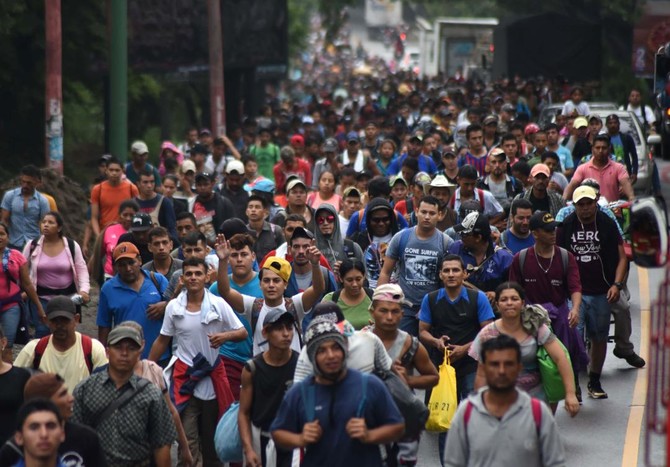
- The migrants are fleeing widespread poverty and gangland violence in one of the world’s most murderous countries
- Many blame Honduran President Juan Orlando Hernandez for what they call unlivable conditions back home
Ground invasion of Rafah would be ‘intolerable,’ UN chief warns

- Israel has killed more than 34,700 Palestinians, around two-thirds of them children and women, according to Gaza health officials
UNITED NATIONS, United States: A ground invasion of Rafah would be “intolerable,” UN Secretary-General Antonio Guterres said Monday, calling on Israel and Hamas “to go an extra mile” to reach a ceasefire deal.
“This is an opportunity that cannot be missed, and a ground invasion in Rafah would be intolerable because of its devastating humanitarian consequences, and because of its destabilizing impact in the region,” Guterres said as he received Italian President Sergio Mattarella.
UK military personnel’s data accessed in hack, BBC reports

- MPs could be informed about the development in the Commons on Tuesday
Some personal information in a payroll system used by Britain’s defense department has been accessed in a data breach, the BBC reported on Monday.
The system was managed by an external contractor and no operational Ministry of Defense data was obtained, the broadcaster said, adding that the department took the system off-line immediately.
Information like names and bank details of current and some former members of the Royal Navy, Army and Air Force was compromised, according to the report.
The Ministry of Defense did not immediately respond to a Reuters’ request for comment outside working hours.
MPs could be informed about the development in the Commons on Tuesday, the report added.
Russia says it takes control of two more settlements in eastern Ukraine
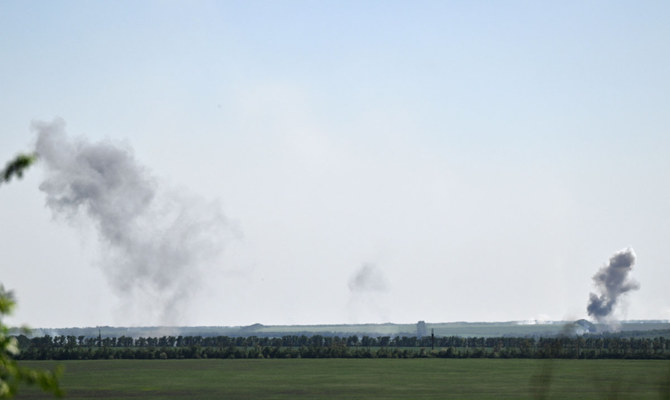
- Russia has made slow but steady advances since taking Avdiivka in February, with a string of villages in the area falling to Moscow’s forces
MOSCOW: Russian forces have taken control of the settlements of Soloviove in Ukraine’s eastern Donetsk region and Kotliarivka further north in the Kharkiv region, the defense ministry said on Monday.
Ukraine’s military made no mention of either locality in its evening General Staff report. Kharkiv Regional Governor Oleh Syniehubov said on Monday that Kotliarivka, located near the town of Kupiansk, was one of several locations to come under Russian shelling.
But Ukrainian bloggers appeared to acknowledge that both villages were in Russian hands.
DeepState, a popular forum on the war, noted on Saturday that Kotliarivka had been captured by Russian forces and on Sunday said the neighboring village of Kyslivka was also in Russian hands.
DeepState reported that Soloviove, northwest of the Russian-held town of Avdiivka, had been taken by Russian forces last week.
Russia has made slow but steady advances since taking Avdiivka in February, with a string of villages in the area falling to Moscow’s forces.
UNICEF warns 600,000 children face ‘catastrophe’ in Rafah
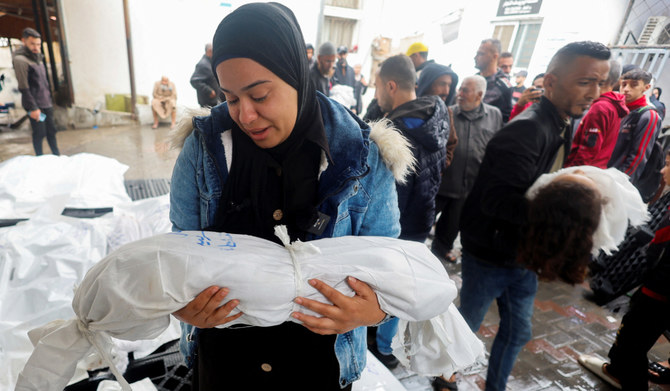
- Calling again for a ceasefire and safe access for humanitarian organizations, the agency highlighted there are some 78,000 infants under age two sheltering in the city, along with 175,000 children under five who are affected by infectious disease
- Israel has killed more than 34,000 Palestinians in Gaza, mostly women and children, according to the health ministry in the Hamas-run territory
NEW YORK: Some 600,000 children packed into Gaza’s Rafah city face “further catastrophe,” UNICEF warned on Monday, urging against their forced relocation after Israel ordered an evacuation ahead of its long-threatened ground invasion.
“Given the high concentration of children in Rafah ... UNICEF is warning of a further catastrophe for children, with military operations resulting in very high civilian casualties and the few remaining basic services and infrastructure they need to survive being totally destroyed,” the UN children’s agency said in a statement.
It said Gaza’s youth were already “on the edge of survival,” with many in Rafah — where the agency said the population has soared to 1.2 million people, half of them children — already displaced multiple times and with nowhere else to go.
“More than 200 days of war have taken an unimaginable toll on the lives of children,” said UNICEF Executive Director Catherine Russell.
“Rafah is now a city of children, who have nowhere safe to go in Gaza,” she said, warning that a large-scale military operation by Israel would bring “chaos and panic, and at a time where (children’s) physical and mental states are already weakened.”
UNICEF estimates that Rafah’s population has swelled to nearly five times its normal figure of 250,000 residents.
Calling again for a ceasefire and safe access for humanitarian organizations, the agency highlighted there are some 78,000 infants under age two sheltering in the city, along with 175,000 children under five who are affected by infectious disease.
Gaza’s bloodiest-ever war began following Hamas’s unprecedented Oct. 7 attack on Israel.
Israel has conducted a retaliatory offensive that has killed at least 34,735 people in Gaza, according to the Hamas-run
territory’s Health Ministry.
Of that toll, more than 14,000 are children, the ministry has said.
Israeli Prime Minister Benjamin Netanyahu has vowed to send ground troops into Rafah regardless of any truce, despite concerns from the US, other countries, and aid groups.
Hamas official Izzat Al-Rashiq said in a statement that any Israeli operation in Rafah would put the truce talks in jeopardy.
Senior Hamas official Sami Abu Zuhri said the evacuation order was a “dangerous escalation” that would have consequences.
“The US administration, alongside the occupation, bears responsibility for this terrorism,” the official said.
Hamas said later in a statement that any offensive in Rafah would not be a “picnic” for Israeli forces and said it was fully prepared to defend Palestinians there.
Aid agencies have warned that the evacuation order will lead to an even worse humanitarian disaster in the crowded coastal enclave of 2.3 million people reeling from seven months of war.
“Forcing 1 million displaced Palestinians from Rafah to evacuate without a safe destination is not only unlawful but would lead to catastrophic consequences,” British charity ActionAid said.
Nick Maynard, a British surgeon trying to leave Gaza on Monday, said in a voice message from the Gaza side of the Rafah crossing into Egypt: “Two huge bombs have just gone off immediately outside the crossing. There’s a lot of gunfire as well about 100 meters from us. We are very unclear whether we will get out.”
“Driving through Rafah, the tension was palpable with people evacuating as rapidly as they could.”
Witnesses said the areas in and around Rafah where Israel wants to move people are already crowded with little room for more tents.
“The biggest genocide, the biggest catastrophe, will take place in Rafah. I call on the whole Arab world to interfere for a ceasefire — let them interfere and save us from what we are in,” said Aminah Adwan, a displaced Palestinian.
Israel has been threatening to launch incursions in Rafah, which it says harbors thousands of Hamas fighters and potentially dozens of hostages.
Victory is impossible without taking Rafah, it says.
New York’s Columbia University cancels graduation ceremony as students remain defiant

- Pro-Palestinian protests put paid to event planned for May 15
NEW YORK: New York’s prestigious Columbia University has announced that it is canceling its main graduation ceremony, scheduled for next week, because of ongoing pro-Palestinian protests.
The announcement on Monday is the latest development in a movement that began nearly three weeks ago at Columbia and has swept college campuses nationwide.
The graduation ceremony had been scheduled for May 15 on the south lawn of the Manhattan campus, where protest encampments had been based before authorities dismantled them last week.
The Ivy League institution said it would “forego the university-wide ceremony” and hold a series of smaller events instead.
“We are determined to give our students the celebration they deserve, and that they want,” Columbia announced, saying “smaller-scale, school-based celebrations are most meaningful to them and their families.”
The university added: “We will focus our resources on those school ceremonies and on keeping them safe, respectful, and running smoothly. A great deal of effort is already underway to reach that goal.”
Students across the US have protested and set up tents at dozens of universities to register their opposition to the war in Gaza, while calling on President Joe Biden to do more to stop the bloodshed.
They have also demanded their institutions cease supporting companies that support Israel’s government.
Maya James, a psychology student at Columbia, told Arab News: “Seeing the university’s really insane response to student protests has brought so many people together, because I feel like most people on this campus can agree, including faculty, that students should not be penalized for expressing their First Amendment rights to protest, to petition, to do all of these things we’ve been encouraged to do for so long.”
She called on the university to give amnesty to students who had been suspended for expressing their First Amendment rights, which protect freedom of speech, the press, assembly, and the right to petition.
James also called on the university to disclose its investments because as “of right now there’s no visibility for us students to be able to know what the university is expected to do.”
She described the “vibes” at the protest sites as “absolutely remarkable,” with cultural and educational programs being offered and all kinds of activities being held.
She said the demonstrations were a continuation of Columbia’s long tradition of protest which began in the 1960s with its opposition to the involvement of the US in the Vietnam War.
James said it was “incredible” to see the solidarity for the Palestinian cause spread in campuses across the US, and people pushing to ensure “that we do indeed see a free Palestine within our lifetime and that our universities are no longer complicit in the genocide.”
Demonstrators have gathered on at least 40 US university campuses since April 17, often erecting tent camps to protest against the soaring death toll in the Gaza Strip. Nearly 2,000 people have been detained, according to the US media.
Police officers have forcibly ended several student sit-ins in recent days, including one at New York University at the request of its administrators.
Demonstrators had barricaded themselves inside Columbia, the epicenter of student protests in New York, and some complained about police brutality when officers cleared the faculty.
(With Agencies)





